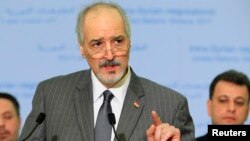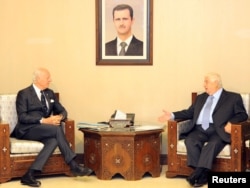Suicide bombings by militants in the town of Homs and airstrikes by government warplanes in recent days in northwest Syria have rattled United Nations-led peace talks aimed at finding a resolution to the six-year-long conflict in Syria.
The warring sides have accused each other of seeking to wreck a peace process that has been limping along for months. Even before these latest developments, the signs indicated there would be no breakthrough this week in Geneva talks overseen by U.N. mediator Staffan de Mistura.
The only good thing that can be said about the Geneva-based process so far is that both opposition and regime delegations have remained in the Swiss town, albeit grudgingly.
Representatives of Syrian President Bashar al-Assad’s regime were due Tuesday to meet once again with de Mistura, who has been urging the warring sides to show respect for each other and avoid trading inflammatory accusations. The U.N. diplomat has not been able to get enough agreement on the faltering peace process, however, to maneuver opposition and regime delegations to sit down face-to-face and start talking.
Last week, at the ceremony to start the fourth round of talks, clear animosity was displayed between the delegations when they did meet briefly. The regime delegation did not wait for the end of the formal ceremony to leave the room, walking out as the U.N. mediator shook the hands of opposition delegates.
The atmosphere has not improved since then, with de Mistura shuttling back and forth between delegations.
This latest peace round, which began last Thursday (February 23), has so far been stuck with regime representatives insisting negotiations should start with an agreement about fighting terrorism, while opposition negotiators remain determined an agreement in principle about a political transition has to be the starting point for any serious discussions.
“The regime’s focus is only on the issue of terrorism and not on the issue of political transition,” according to Oubai Shahbandar, an analyst with the New America Foundation.
The High Negotiations Committee (HNC), the main opposition delegation, cast doubt Monday about the government’s willingness to negotiate an end to a conflict that has left as many as 470,000 people dead and millions displaced. In a statement, the head of the HNC delegation said they had yet to meet “a partner seeking peace in Geneva.”
“We are engaging constructively,” said Hind Kabawat, an HNC delegate. “But the regime has never been serious; they don’t want to negotiate. They want to provoke us to leave, but we are not leaving,” she added.
On Wednesday, HNC delegates are due to meet with Russia’s deputy foreign minister, Gennady Gatilov, and its Middle East director, Sergei Vershinin — a further indication that at least the main opposition delegation intends to stick with the process despite the lack of any real progress.
The HNC hopes to persuade Moscow to put pressure on the regime to engage seriously when it comes to outlining a political transition. It is likely, though, that Gatilov will follow the regime’s prioritization of terrorism, judging by comments he made Tuesday to reporters in Geneva.
“Definitely yes,” Gatilov said when asked if terrorism should be included in the Geneva agenda. “Terrorism is a priority. The fight against terrorism is a priority and it should be on the agenda."
Asked about his planned meeting with the opposition on Wednesday, he added, "I don't know what they are going to insist on; that is why we are going to meet them to know their position.”
“These negotiations have so far focused on procedural issues and are yet to discuss the substantive agenda of governance, constitution and elections,” according to Randa Slim, an analyst at the Middle East Institute, a Washington-based research institution.
The dynamics, she says, are against there being any breakthrough. She cites as a reason for this “the unequal military power equation,” which “reinforces the Syrian regime’s no-concession strategy.”
Slim argues that uncertainty surrounding the Trump administration’s future Syria strategy isn’t encouraging Moscow to push Damascus to make concessions now. And, she says, “The international community’s failure to achieve and enforce a national cease-fire and create sustained improvements in humanitarian conditions on the ground makes the armed opposition and their constituencies wary of political talks.”
European diplomats say the talks are likely to be suspended Friday with a resumption provisionally scheduled for March 20; but events on the ground could undermine that schedule. Over the weekend, clashes between Turkish-aligned rebel groups and government forces erupted near the town of al-Bab, northeast of Aleppo. Those clashes risk intensifying.
And the leader of an al-Qaida-linked group in Syria on Monday derided exiled Syrian politicians and rebels for taking part in the Geneva talks, arguing in a video posted online that they “were handing victory” to Assad. The remarks by Abu Mohammed al-Golani, head of Jabhat Fateh al-Sham, now part of an ultra-conservative alliance known as Tahrir al-Sham, suggests militants will continue to launch attacks that risk derailing the already highly precarious peace talks. Tahrir al-Sham claimed responsibility for the bombing in Homs.










